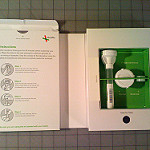Aggregated News

Submitting a vial of spit to a genetic testing company is easy. Understanding the implications — and regulating the burgeoning industry — is not.
LATE LAST MONTH, Senate Minority Leader Chuck Schumer took a break from the tax bill debate to talk with reporters about genetics.
In a press conference, the New York senator criticized how direct-to-consumer genetic testing companies — outfits like 23andMe and AncestryDNA — discuss and handle users’ genetic information. “What those companies can do with all that data — your most sensitive and deepest info, your genetics — is not clear, and in some cases not fair and not right,” said Schumer.
“It shouldn’t be that they can sell it and the consumer doesn’t know,” he added.
Schumer called on the Federal Trade Commission to launch an investigation into genetic testing companies’ privacy and disclosure practices, though the commercial and regulatory tides seem — at least for now — to be going in the other direction. Discounted prices for 23andMe dropped below $50 earlier this year, and sales of AncestryDNA kits are breaking records: In...



